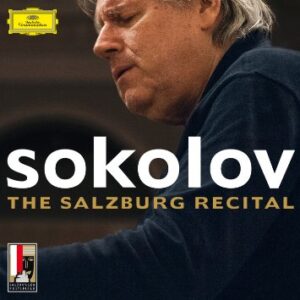Deutsche Grammophon has a history of signing exclusive contracts with pianists who cultivate enigmatic and awesome reputations, such as Martha Argerich, Arturo Benedetti Michelangeli, and Vladimir Horowitz, and now Grigory Sokolov. It’s quite a catch, to say the least, because for years Sokolov has refused to affiliate himself with a record company, enter a recording studio, or play a concerto.
For their first project, Sokolov sanctioned the release of his July 30, 2008 Salzburg Festival recital, and it reveals the pianist’s extraordinary finesse, concentration, and individuality in full fettle. Interpretively speaking, Chopin’s Op. 28 Préludes are quite similar in conception to Sokolov’s live 1990 recording, although occasionally different in detail. Reviewing the latter for Classicstoday.com, I praised Sokolov’s “untrammeled, personalized pianism,” which possessed “a kind of freedom that seems fueled by creative inquiry rather than unfounded, willful eccentricity.” And so it is here, except that the fuller-bodied Salzburg engineering seems to position at least one microphone at closer range, giving note attacks just a little more edge. For example, the elegantly and effortlessly shaped etude-like G major, F-sharp minor, and E-flat Preludes seem more specific in regard to linear contouring. The 1990 G minor’s italicized upbeats and tension-filled rubatos are virtually identical in 2008. Yet in other cases it’s clear that Sokolov has changed.
The tumultuous B-flat minor now benefits from less pedal and crisper articulation, although the C-sharp minor’s descending right-hand arpeggiated figures emerge less fluidly. In 1990 Sokolov milks the A minor’s gnawing left-hand dissonances, while in 2008 he rounds them off. The present F minor Prelude scores for heightened dynamic contrasts and dramatic flair. And I much prefer Sokolov’s brisker, more direct rethinking of the B-flat major to its earlier, more stretched and relatively mannered counterpart.
The two Mozart sonatas that open the recital are highly calibrated and polished from a pianistic angle, subjecting all phrases, ornaments, dynamic scaling, contrapuntal balances, and chord voicings to immense scrutiny. But don’t get the impression that Sokolov is embalming Mozart: far from it. His judicious tempo choices and consistently singing tone keep the music alive and engaging, especially in the slow movements.
If anything, the encores are even more magical. The two Scriabin Op. 69 Poèmes stand out for Sokolov’s gorgeous textural layering and nuanced rapid figurations. A moody and hypnotically sustained Chopin A minor Mazurka Op. 68 No. 2 precedes a C-sharp minor Op. 63 No. 3 Mazurka where nearly each measure suggests a different mood and keeps you guessing, yet manages to logically flow from one into the next. After an ebullient and brilliantly ornamented Rameau Les Sauvages, Sokolov closes with a Bach/Busoni Ich ruf zu dir where the pianist’s ideal alignment of top chorale melody, animated inner voices, and gently present bass lines creates a lovely transparency that far surpasses, say, Simone Dinnerstein’s weighty, heavily accented traversal. I hope that Sokolov will consider further archival bounty worthy of release.
































